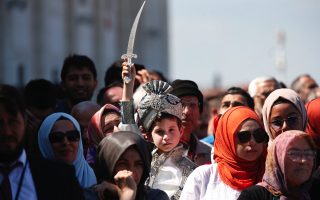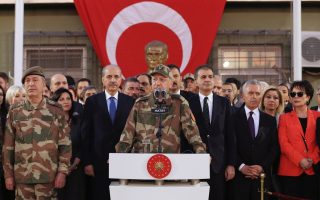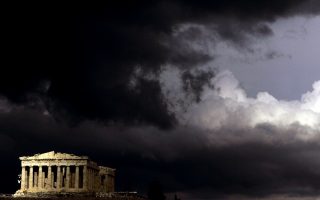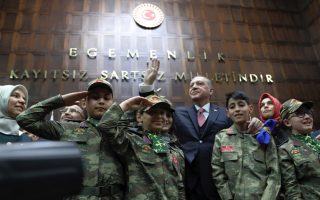In runup to Turkey’s 2019 presidential vote, Erdogan facing precarious reality
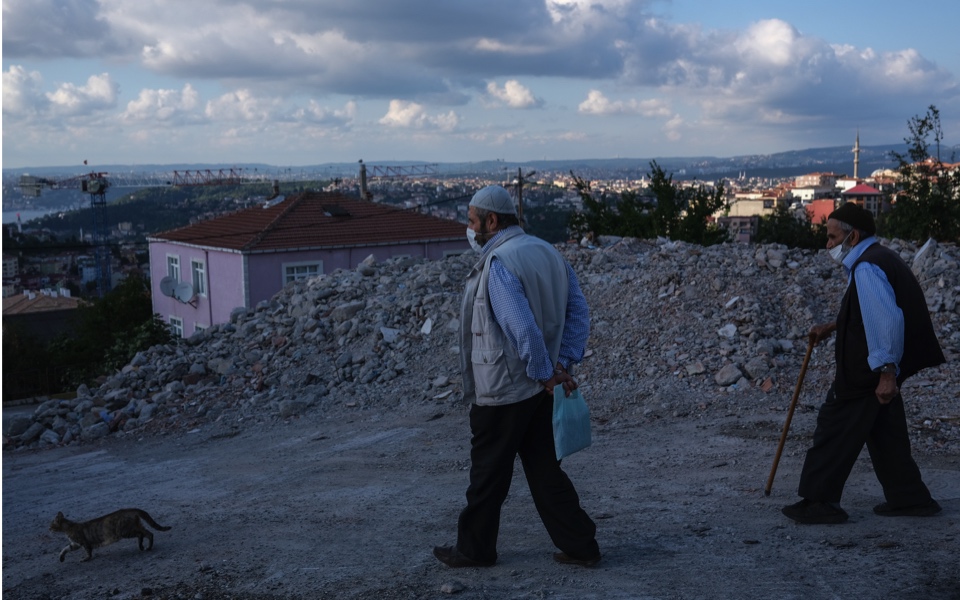
As he prepares for the upcoming presidential elections, Recep Tayyip Erdogan faces a precarious reality.
Upon arriving at Istanbul’s bustling Ataturk Airport, one of the first things that catches a traveler’s eye is an imposing poster. Depicted at its center is the Turkish president, gazing out over the crowds with a stoic expression.
Erdogan’s image reappears countless times along the routes toward the city. It can be seen inside the busy metro carriages, on giant posters covering dozens of majestic buildings scattered around Istanbul, and it dominates the covers of most of the country’s newspapers. His continuous presence creates a daunting impression, as if Turkey has completed the transition to a state of monarchy.
To a large extent, the Turkish reality offers little to rebut that impression. The judiciary has more or less succumbed to the president’s influence, with more than 90 percent of the vacancies at courts and prosecuting authorities – a void created by repeated purges targeting thousands of people – now being occupied by members of the governing party’s local organizations. The same applies to the military, where the ruling AKP party has replaced almost all of the country’s highest military personnel. And with the recent acquisition of the historic Dogan publishing group by the pro-government conglomerate of Erdogan Demiroren, as well as more than 300 journalists behind bars, the Turkish press is now fully in line with the president’s unilateral narrative.
However, Erdogan’s longstanding effort to consolidate power requires one more thing: the consent of Turkish society in the 2019 presidential elections. There, he faces a more complicated, precarious reality. Even though his popularity remains extremely high, it is steadily below the 50 percent threshold necessary to guarantee him an easy win from the first round. More importantly, recent polls show that a significant segment of the AKP’s electoral base is starting to express feelings of fatigue with the government’s increasingly authoritarian line and the continuous removal of moderate party members.
Regarding the conservative neighborhood of Balat – a traditional electoral stronghold for Erdogan, in the heart of Istanbul – a brief conversation with the residents is enough to confirm this fatigue. “Erdogan has good intentions, but the government’s arrests may have been a bit excessive,” say elderly locals, with an enthusiasm curbed far more than one would expect in the conservative neighborhood. Turkey’s political scene seems to reflect their sentiments – both the newly formed right-wing Good Party led by Meral Aksener, as well as the Islamist Saadet Party, direct competitors to Erdogan’s ideology, are slowly yet steadily rising in the polls.
Notwithstanding the impression of his continuous presence and unwavering self-confidence, Erdogan is not resting on his laurels. Far from it: He is feverishly preparing for the upcoming elections with the unsettling memories of his marginal victory in last year’s referendum freshly etched in his mind. His nervousness is betrayed both by the recent changes to Turkey’s electoral law – a strategic move that facilitates an alliance with the Nationalist Movement Party (MHP), boosting his electoral share – as well as the daily election-style speeches across the country. The invasion of Afrin, the escalating tensions with Greece and Cyprus, and the constant stream of nationalistic proclamations against Europe and the United States are part of an effort to garner the support of the conservative Turkish public that he urgently needs to secure a victory.
Last week, the government’s attempts to crack down on opposing narratives reached a terrifying level when Turkish police raided the dormitories of Bogazici University, arresting seven students who had participated in a demonstration against the offensive in Afrin. Speaking in the northern province of Samsun, Erdogan announced an investigation into the students, declaring that “we won’t give these terrorist youth the right to study at these universities.” That a small group of protesting students would provoke such a powerful response is a testament to an alarming reality: A nervous Erdogan is also the most unpredictable, and dangerous too.

